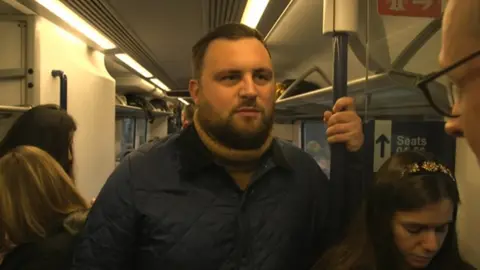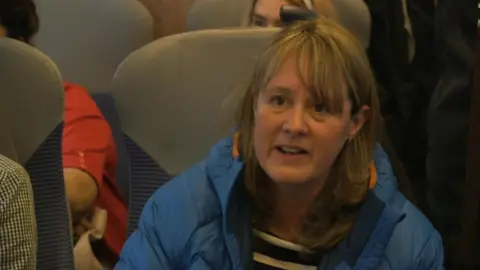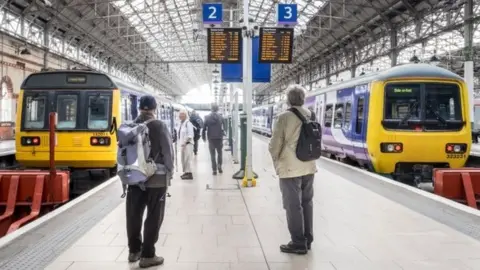Transport spending in north of England less per head than London
Transport spending in London is two-and-a-half times more per person than in the north of England, new figures have shown.
Treasury data shows that in 2018-19, £903 was spent in the capital for every resident, while the north had £376.
Passengers in Leeds said it showed "one rule for them and one rule for us".
The government said its spending decisions were "rigorous and fair", and said the figures did not include money for future projects like HS2.
Centre-left think tank IPPR North has analysed HM Treasury figures for 2018-19.
They showed across the UK £481 was spent on transport per person - but this varied from £903 a head in London, to £268 in the East Midlands and £276 in Yorkshire and the Humber.
The think tank's interim director Arianna Giovannini said the north deserved better after years of "chronic underinvestment".
The data included all public spending, and was based on the number of residents in the region.

Alex Hodgson, who travels from Dewsbury into Leeds every day, said he saw trains delayed and so overcrowded people could not get on them.
"Every single morning it's the same story," he said. "The next train is meant to be here in the next 20 seconds but it's delayed by ten or 15 minutes so you're not going to get into Leeds before nine o'clock."
It left northerners feeling "it's like one rule for them and one rule for us", he said.
"We've got to live as well and we've got to earn - but we can't do that with such poor transport links."

Claire Bates said she had considered leaving her job as a hospital consultant because of her journey to work.
"It's actually quite upsetting, as you sit here you watch the clock tick and you're delayed and there's nothing you can do about it," she said. "It's really frustrating."
The IPPR North analysis showed investment had fallen in the past year.
- Spending per head dropped by £30 (9.9%) in Yorkshire and the Humber between 2017-18 and 2018-19, and by £78 in the North West (16%).
- In London, it fell by £52 per person (5.4%) over the same period.
- A big increase in spending in the North East (£211 per head or 76%) was down to Highways England spending and was unlikely to be maintained based on known government spending commitments, according to the think tank.
Dr Giovannini added: "Sometimes there is an argument that goes along the lines of 'there are more people in London and there are a lot of people travelling in London and commuting in London', but our point is not that London should get less, it's not an 'either or' argument.
"The point is that the north deserves a level of investment that allows it to improve its transport infrastructure once and for all, so that people can have a better quality of life, they can travel to work and businesses can benefit."
In an announcement on Wednesday, the Conservative party pledged £4.2bn for local public transport.
Transport Secretary Grant Shapps said the party would give local leaders the final say, but expected a new Local Public Transport Fund to back schemes including a new metro or light rail in West Yorkshire and investments in seven other areas.
Speaking last week on the subject, Chancellor Sajid Javid said the north had "lost out" on infrastructure investment under successive governments, with too much focus on the South East and London.
"That needs its fair share, but we need to do more to level up across the country," the Conservative politician said.
Labour's shadow chancellor John McDonnell, when speaking last week, also said it was not acceptable for some parts of the country to get many times more investment than others. Tackling regional inequality was about making sure institutions were located in the regions as well as making the money available, he added.
The Department for Transport pointed to explanations about the Treasury's figures, indicating London's higher spending included capital investment from Transport for London, and did not account for commuters and visitors from outside the city.
What the manifestos say
The Conservatives have promised to invest £100m in additional infrastructure spending. They said they wanted to "level up" the UK's cities and regions by connecting them, were pledging to build Northern Powerhouse rail and invest in the Midlands Rail Hub.
They have promised to give cities power over their bus, tram and train links, and restore rail lines cut under the Beeching act in the 1960s.
Labour's manifesto pledged to renationalise the railways and slash fares by a third, to electrify rail lines and build "Crossrail for the North" as well as HS2. The party has also proposed to let councils take over bus services and give free bus travel to under-25s, and reinstate 3,000 axed bus routes.
The Liberal Democrats said commuting by rail was "expensive, unreliable and unpleasant", and have promised to freeze fares while they fixed the broken system.
 Transport for Greater Manchester
Transport for Greater ManchesterThe party supported major projects such as HS2 and Northern Powerhouse rail, and wanted to make healthier forms of transport like walking and cycling a higher priority, and invest in public transport.
The Green Party said it wanted to scrap HS2 and electrify all rail lines between cities, bringing railways back into public ownership.
They have promised a "Green New Deal" for transport, with £2.5bn spent on cycleways and footpaths, encouraging coach travel, opening new rail connections and reopening closed stations. They wanted councils to have responsibility for short distance rail routes.
The Brexit Party's manifesto has promised to scrap HS2 and invest at least £50bn in road and rail schemes in "development-starved regions".
For more on each party see: Who should I vote for? General election 2019: Compare the party manifestos.
